John R. Williams
1851-1927
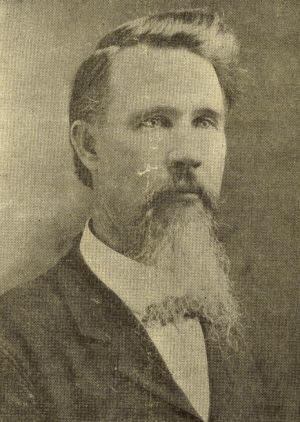
Table Of Contents
Biographical Sketch On The Life of John R. Williams, Srygley
John R. Williams, Overton
John R. Williams. . . Missionary In W. Tennessee, Hester
Hornbeak Revisited, Doran
Grave Location And Photos
Biographical Sketch On The Life Of John R. Williams
John R. Williams was born in Marshall County, Tenn., December 31, 1851. When he was six years old his father died, leaving him and two sisters younger than himself to make their way in the world as best they could, by the help of their widowed mother. He was brought up to hard work on a farm, and from early boyhood was thoroughly drilled by necessity in the hard but important lesson of self-reliance. His opportunities in life were such as people ordinarily consider very poor.
He attended free school before the war three sessions of three months each session. The war broke up all country schools, disturbed society, interrupted business and commerce of all kinds, and demoralized hte people in general at a period in his boyhood when he greatly needed stable influences and environments in the formation of his character. However, the demand for hard work and constant employment to provide the necessaries of life saved him from the dangers peculiar to the evil days in which his boyhood was spent.
When he was seventeen years old, he moved with his uncle to Obion County, West Tennessee, where he still lives. He was married to Miss Mollie Moultrie, November 7, 1871, who has been a faithful helpmeet in all his life work since then to the present. After two of his children were old enough to attend school, he entered school again himself, and continued five months, which closed his career in school. However, he was a diligent student, and he made good use of his time and opportunities by continuing his studies at home under whatever circumstances he lived.
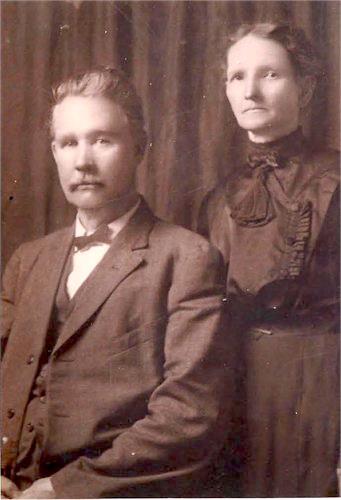 His first religious experience and practice were in the Methodist Episcopal
Church, South, of which he was a member for four years. In July 1876, he
abandoned the Methodist Church, and, following the way which to him seemed
plainly taught in the New Testament, he was "baptized into Christ" (Rom. 6:3,4;
Gal. 3:27) by J.H. Roulhac, of Union City, Tenn.
His first religious experience and practice were in the Methodist Episcopal
Church, South, of which he was a member for four years. In July 1876, he
abandoned the Methodist Church, and, following the way which to him seemed
plainly taught in the New Testament, he was "baptized into Christ" (Rom. 6:3,4;
Gal. 3:27) by J.H. Roulhac, of Union City, Tenn.
With such helps as he could get, he applied himself to the study of law, and April 3, 1883, he was licensed to practice law before the county and magistrate courts of Obion County, Tenn. He continued the study of law as he practiced in the minor courts till November 13, 1885, when he was licensed to practice law in all the courts of the State of Tennessee: In July, 1886, one year after he was enrolled as a regular attorney with authority to practice in all the courts of the State, he was invited to preach at Wilsonville, Tenn. In this way he began the life and work of a preacher, which he has continued to the present day.
He has labored extensively and successfully as an evangelist in Tennessee, Illinois, Arkansas, Missouri, and Kentucky. He has held eight public discussions--four with Missionary Baptists and two with Second Adventists.
He is an energetic, industrious, and enterprising citizen, as well as a devoted Christian and a successful evangelist. He takes an active interest in business and industrial enterprises which promise to develop the recourses of his country and improve the condition of the people at large, but in all this he never neglects his Father's business in the matter of preaching the unsearchable riches of Christ. He has baptized many hundreds of people and has established many congregations of Christians. He has strong confidence in the power of the gospel to convert the soul, and he closely adheres to the word of the Lord on all questions of doctrine as a preacher; he is equally strong in his conviction that the Holy Scriptures given by inspiration of God are all-sufficient to guide Christians and churches in all matters of religious work and worship, anf or that reason he insists upon keeping clearly and safely within the limits of New Testament teaching and examples in all matters of doctrine and practice for both saints and sinners. He is an original thinker, a vigorous speaker, and a kind-hearted and gentle-spirited Christian.
The field of his labors is gradually widening, and as he is as yet in the vigor of mature manhood, there is promise of many years of effective labor before him in the service of the Lord.
-F. D. Srygley, Biographies and Sermons, c.1898. pgs. 114-117
JOHN R. WILLIAMS
John R. Williams was born in 1851 and he died in 1927. No doubt he indirectly influenced me because he labored for the Lord Jesus many years in my native Northwest Tennessee.
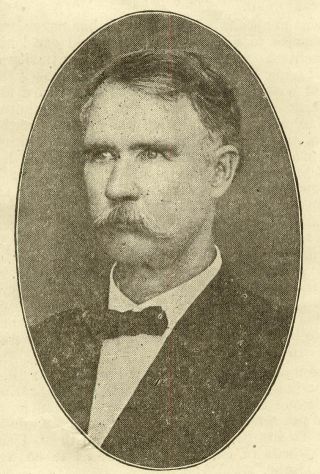 Coleman Overby, a distinguished evangelist and Bible scholar
was editor of The Primitive Christian which was published in Union City,
Tennessee. The October 1,1927 issue of that paper was devoted to honoring
brother Williams soon after his death.
Coleman Overby, a distinguished evangelist and Bible scholar
was editor of The Primitive Christian which was published in Union City,
Tennessee. The October 1,1927 issue of that paper was devoted to honoring
brother Williams soon after his death.
A beloved evangelist whom I knew and loved and who greatly influenced my life was W. S. Long. In The Primitive Christian of October 1, 1927, brother Long wrote the following.
Brother John R. Williams As I Knew Him
"One of the best, bravest and noblest of God's soldiers has finished his earthly service and gone to receive his crown. Truly may it be said of him, 'For to me to live is Christ, and to die is gain.' 'Precious in the sight of the Lord is the death of his saints.'
"It was in the fall of 1896 that Brother Williams came to my father's home to spend the weekend and preach in that community. I was a timid boy, but when I entered the room and he reached out his hand of love to me I felt that I had met a friend. This was true indeed, and through all these years of struggle I have never had a better friend. A few years later I entered school at Hornbeak, and while there made my home with brother and sister Williams. They were all that two Christians could be to a boy away from home for the first time in life. It was while in this home that I decided to give my life to preaching the gospel, and Brother Williams gave me more encouragement more than anyone outside of my own parents. And when I attempted to preach my first discourse he was there and prayed for my success and spoke words of encouragement. In those days in my young life he gave me such good advice and guarded my interests as much so as if I were his own son.
"My pen fails when I attempt to tell how much I have loved Brother and Sister Williams and their children. The church of Christ has lost one of its strongest and best gospel preachers, and Obion county one of its most valuable citizens. Some one has said, that when God made Paul he smashed the moulds to pieces and there was but one Paul. God has given to the church of Christ but one brother John R. Williams, and there can never be another to take his place.
"Space will not permit me to dwell on the many characteristics of his life that have caused me to hold him in so high esteem, but let me mention a few.
"Sincerity. - He was sincere in all he did. There was no "put on" about him, he was just what he claimed to be. He had no patience with hypocrisy and had no part or lot in such sins.
"Earnestness. - This was another outstanding trait found in him. So earnest was he in his preaching that some thought he was mad, but like Pad of old, he was speaking forth "the words of truth and soberness." He warned people day and night with tears.
"Sacrifice. - It mattered not where the call and what the cost brother Williams would go if he could and preach the unsearchable riches of Christ regardless of financial support, and I am safe in saying that he made more sacrifices to preach Christ in mission fields than any preacher of his day and generation.
"Sympathy. - This ever abounded in his great life and those who knew him best can say he had a big heart, and poured out his tears with those in trouble, and often took the last dime he had to help the needy.
"Courage. - This trait stood fourth on the brow, in the heart, and the words of this great man of God, and he fearlessly preached the whole counsel of God regardless of the cost. He would have given up every friend he had on earth, and then his own life before he would have sacrificed one principle found in the Word of God.
"Truly can it be said of him, 'Blessed are the dead that die in the Lord from hence forth: Yea, saith the Spirit, that they may rest from their labors; and their works do follow them.'
"And now since he has finished his work, does it not seem good in the wisdom of God to take him home to rest? He has baptized and taught many how to retch heaven and many of these, with other noble friends of his, have gone on before. So, there is being held a great reunion over there that will never cease. We shall pass over very soon and join them in that land .of peace where no sorrow shall come and no tears ever fall. Let us praise God for such a gospel." (End of brother Long's article.)
Another true friend who tremendously influenced my life was N. B. Hardeman. It was my fortune to sit at his feet three years. Brother Hardeman wrote the following about John R. Williams in that same issue of The Primitive Christian.
John R. Williams
"It is with a feeling of tenderness and reverence that I try to write these words. In the death of brother John R. Williams, the Cause of Christ has lost a mightly power and a great friend He belonged to a class that is by far too few. He was akin to our pioneers. He understood and appreciated full well the Restoration Movement. His life was spent in an ernest effort to bring about the ancient order of things. Human organizations found no favor in his sight. His time and his influence were devoted to the building up of the Church Jesus died to establish.
"Brother Williams was not of the kind that took a text, and then "went every where preaching the word.' His labors were confined most largely to the counties of Obion and Lake, and the thirty or more congregations there are evidences of his fidelity and loyalty to God's word. He was a man of strong convictions, and was neither afraid nor ashamed to declare them whenever and wherever he thought good might result.
"In this issue of the Primitive Christian, made sacred to his memory, we recall his unwavering devotion to duty, his lifelong respect for manly honor, and his unfeigned faith in the word of God. These were the pillars upon which his character was built. The achievements of selfish ambitions are ephemeral. The crowns they bring to weary brows soon crumble into dust. Their laurels wither in an hour. But the monuments built by a man of God defy the wrath of storms and master the might and blight of time.
"Self-sacrifice and devotion to duty are the loftiest and most enduring attributes of the soul. In the life of brother Williams these qualities were outstanding. By the sternest code of honor, he lived a life of rectitude. I believe it can be truly said, that neither to the right, nor to the left, under whatever temptation, throughout a long life full of action, did he ever swerve by the breadth of a hair from the path of honor or conviction of what he believed to be right.
"The Christian's faith and hope were surely his. His death was a fitting close to such a life and a happy realization of the prophet's prayer: "Let me die the death of the righteous, and let my last end be like his." He died knowing full well that the gates of death were but the portals of life immortal. He has laid aside his battlescarred armor, and has passed to realize all of his hallowed hopes and holiest desires.
"It was a genuine pleasure to know brother Williams, to be in his humble home, and to hear him tell the Story which, to him, never grew old. All we may say of him will soon be forgotten, but that life of self-sacrifice, true devotion, and wonderful faith in the "Old Book" will live on and on.
" 'Servant of God, well done!
Thy glorious warfare's past,
The battle's fought, the race is won,
And thou art crowned at last.' "
(End of N. B. Hardeman's article.)
It was not my fortune to know John R. Williams, but when time shall be no more, when the Lord of life shall appear, and his saints shall be like him, and see him as he his, I expect to meet and greet among the hosts of heaven, John R. Williams and many whom he influenced with the gospel to be in that number.
If anyone has a collection of copies of The Primitive Christian he would give to the library at International Bible College, please let this editor know.
W. R. Hassel, Eph Smith, and Joe Ratcliffe conducted the funeral service for brother Williams. Ealon V. Wilson conducted the song service at the funeral. Brother Wilson has published a book entitled: Life and Ministry of John R. Williams.
-Basil Overton, Editor, World Evangelist, January, 1977, page 13
JOHN R. WILLIAMS (1851-1927)
A TRUE MISSIONARY IN WEST TENNESSEE
I. BRIEF BIOGRAPHY
John R. Williams was born within two miles of Lewisburg in Marshall County December 30, 1851 of poor and humble parents. Because the Civil War was breaking out when he was of school age, he did not get to attend school. He only spent about fifteen months in the classroom as a pupil. At the age of eighteen he moved to Obion County and two years later married Mollie R. Moultrie. One of his sisters led the way for the family in her obedience to the gospel and encouraged John to do the same. He was baptized by J. H. Raul on July 30, 1876, just a few days after the American centennial.
In April of 1883 he was licensed to practice law before the county court and in July of 1885 committed himself to preach the gospel. In November of the same year he was licensed to practice law in all the courts of the state, but made the decision to give his full energy to preaching. In his seventieth year he wrote, "From that day to the present I have been a poor man-made no money, therefore have none now. I managed to feed, and clothe my family, after a manner, and give to each of my children, now living, a practical education and taught them how to work."
Williams did most of his preaching in Obion and surrounding counties and for several years wrote a popular report for the Gospel Advocate entitled "Notes from West Tennessee." By his seventieth birthday he had baptized about 2500 people, established 18 congregations, revived 4, and had encouraged the building of about 13 church buildings. Most of his work was spent in evangelizing new areas. During the years 1885-1925 no one preached more tent meetings in West Tennessee than John R. Williams.
During his work up to 1921 Brother Williams held fourteen public discussions. Seven were with Missionary Baptists, two with Primitive Baptists, two with Seventh Day Adventists, and three with Methodists. In 1906 he held a joint gospel meeting with the famous Baptist preacher, I. N. Penick.
II. AS A PREACHER
Williams was constantly pressing forward the missionary work in West Tennessee. During the years when the Christian Church was emphasizing the society method of evangelizing, Williams was holding many tent meetings. During a week when the Tennessee Christian Missionary Convention was in session at Union City, Williams asked:
I wonder if it will send some man and a tent to any of the destitute places in West Tennessee. Would it not rather send a man to some old, established congregation to divide it over the things condemned by the word of God?'[1] [1 Footnote: John R. Williams, "Notes from West Tennessee," Gospel Advocate 45 (October 15, 1903). 669.]
In 1906 a sister wrote him from Lynnville: "After all the talk about mission work in West Tennessee, I see you are the true missionary."[2] [2 Footnote: John R. Williams, "Notes from West Tennessee," Gospel Advocate 48 (March 15, 1906). 170.]
Williams helped churches move forward in their work, but he also helped the churches through the trying times of the separation from the Christian Church and the Disciples of Christ. He noted in 1906 that the "clouds of war" were lowering and that the churches of Christ were "strengthening" their forces. He felt that the future looked bright for the faithful churches, but he longed for people would stand only on the Word of God.
Williams kept his sermon outlines in a small leather loose-leaf notebook. When closed the volume looked like a thin Bible. Scriptures were pasted into the beautifully handwritten outlines. Some of the sermon titles were: "What Should the Love of Christ Do For US?" "The Holy Spirit-Present in All Beginnings," "Is There a Third Party in Salvation?" "Worldly Fashions," "Opinion, Faith, Knowledge," "Is Heaven Gained Without Effort?" "What God Says Do, He Says Do It Now."
III. AS A PARENT
It is interesting to note the spiritual progress of one of the nine children of John R. Williams during the year 1903. Len D. Williams had entered Georgia Robertson Christian College at Henderson, a school whose literary work Brother Williams considered "second to none."
After Len had been at the school a short while he wrote home and expressed his intention to preach the gospel. Brother A. G. Freed also wrote Brother Williams and reported that Len was "succeeding well in all his studies." During semester break Len preached once or twice for his home congregation at Hornbeak. Thereafter, the church gave him an appointment to preach on every second Sunday.
In August of that year Len preached his first two gospel meetings. In the second meeting eighteen responded and fourteen were baptized. His first convert was a seventy-nine year old lady who had been a Baptist for fifty years. In October Len became involved in an unusual meeting. His dad tells he story:
The congregation at Hornbeak had decided to have another meeting some time this fall and had written to one or more preachers of renoun (sic); but all were busy, could not come. Last Sunday (September 13) was the day for my son to fill his regular appointment at Hornbeak. He did so, expecting to leave for Henderson on Monday morning for another year in school, when, to the astonishment of the congregation, the meeting started itself. Up to this (Thursday morning eight persons have been baptized and two have been reclaimed. I suppose that the brethren will not send for the big preacher now, but will let the meeting held by the little preacher suffice for the present in the way of accession.[3] [3 Footnote: John R. Williams, "Notes from West Tennessee," Gospel Advocate 45 (October 1, 1903). 635.
-Sam E. Hester, Freed-Hardeman Lectures, 1979, pages 115-117]Brother Williams felt that no greater duty or obligation rested upon parents than that of bringing up their children in the "nurture and admonition of the Lord." As he put it: "proper instruction, influence, and safeguards given to children around the home fireside will result in good."
CONCLUSION
Brother Williams made a good impact for the gospel in his day and even after his death. Several living today look back to him with appreciation and admiration. He was an important man of the church in an important time for the church.
Perspectives And Profiles Of The Past
Hornbeak Revisited
The church of Christ in Hornbeak, Obion County, Tennessee, recently conducted a gospel meeting in which I did the preaching and Randy Williams led the singing. We had excellent attendance and three people were baptized -- a young man, his wife, and his sister. Richard Jones, a well known and highly respected native, is the local preacher. A large number of ministers and elders from other congregations visited the meeting.
I had held a meeting in Hornbeak fifty years ago. In fact Mignon and I were here for revivals in 1939 and 1940. During the two meetings, I baptized 20 people in the waters of Reelfoot Lake which was formed by an earthquake in the New Madrid Fault in 1811. Two of the individuals who were baptized then, James Darnall and Irene Baker, attended the recent series of meetings.
The church in Hornbeak was established sometime prior to 1876 and John R. Williams went there to live and preach in 1885. When we went to Hornbeak in 1940, Mrs. Williams was still living there as was her youngest son, Scott. She gave me some of brother Williams' old books. I bought my first Tennessee Walking Horse from Scott in 1940. I learned to ride the beautiful and fascinating breed, and in 1975 I rode Hawk's Mystery to the Amateur World Championship at the National Tennessee Walking Horse Celebration in Shelbyville, TN.
The story of the life and preaching of John R. Williams is the story of the Restoration Movement in Hornbeak and Obion County. Williams was born in Marshall County, Tennessee, on December 30, 1851. His father was a Methodist preacher and he was reared in the doctrine of Methodism. However, he was converted and baptized b J. H. Roulhac on July 30,1876. Roulhac was listed as preacher for the Union City Christian Church as early as 1874. Williams married Mary Moultrie on November 17, 1871. To this union were born nine children. His first and last meetings were conducted at Mennick, Tennessee.
Williams was responsible for establishing most of the congregations of the church in Obion and Lake counties. He, with a singer, would go to a community, pitch his tent and preach as many weeks as it took to establish and organize a congregation. He incurred the strong opposition of the sects who called him a "mule skinner," because of his straight forward preaching of the gospel. Williams considered himself a little preacher fitted to preach for small rural congregations. He remarked that the large churches would not permit him to preach for them and the big preachers did not want to preach in the mission fields where he did.
The Restoration Movement was late in coming to Obion County. Barton Warren Stone lived and preached for a while in Middle Tennessee and Alexander Campbell traveled up and down the Mississippi River in. the early 1800's but neither was inclined to stop and preach in far west Tennessee. The first congregation of Christians only to be established in Obion County was organized at the Old Republican Meetinghouse four miles west of what is now Union City, the County Seat. On October 29, 1848, thirteen persons "agreed to live together as Christians at the Republican Meetinghouse and gave themselves to one another and to the Lord." After the group had moved to a new location in Union City, Jacob Creath, Jr. reported that he went there in early 1868 and after one sermon he baptized 20 people.
The American Christian Missionary Society was organized in Cincinnati, Ohio in 1849 and the melodeon was introduced into the worship at Midway, Kentucky, by L. L. Pinkerton in 1859. The Tennessee Missionary Society was organized in Nashville in 1890 and the organ was introduced into worship by the Union City Christian Church in 1891. Many of the members withdrew from the Christian Church when the organ went in and led by P. Y. White they formed what is now the Exchange Street Church of Christ. Williams, David Lipscomb and F. W. Smith were among the first to preach for the "non-organ" church. Williams also participated in a public debate with a Methodist preacher in Union City which caused quite a stir.
John R. Williams found himself vehemently opposed to the Society and the organ. He was very effective in holding the line against both in the West Tennessee churches. Ye wrote a regular column for The Gospel Advocate which he titled "Notes from West Tennessee" and served as an associate editor of the Primitive Christian which was edited and published by Coleman Overby. Because of his writings the Baptists called Williams the "Campbellite Watchdog of West Tennessee."
In 1897, the Georgia Robertson College was organized in Henderson as the successor of the West Tennessee Christian College. A. G. Freed and E. C. McDougle served as co-presidents and N. B. Hardeman and L. L. Brigance were members of the faculty. The organ had been introduced into the Henderson Christian Church by Knowles Shaw, the singing evangelist, in 1877. McDougle stood firm for instrumental music and the Missionary Society. The college was under the strong influence of both.
Williams was one of the first to raise his voice against the situation in both the college and the church. His oldest son, Len Day, was a student in the college and Williams threatened to withdraw him and send him to the Nashville Bible School unless some changes were made. However, Freed assured Williams and others that he had tentative plans to change the situation or leave the college. Williams wrote in The Gospel Advocate that "Brother Freed has laid his plans and convinced me of the course he would follow."
In January 1903, E. A. Elam went to Henderson and preached in a gospel meeting. He was strongly opposed by the elders of the Christian Church [see R.P. Meeks additional info from webmaster] but he was able to convince Freed, Hardeman, Brigance and a large number of the college students to leave the Christian Church and organize the Henderson Church of Christ. The Elam meeting was followed by the Joe Warlick-J. C. Stark debate on mechanical instruments of music in worship. This debate strengthened the position of John R. Williams and most of the congregations in West Tennessee. Foy E. Wallace, Jr. wrote: "(The) debate that stopped the music movement, and had it not been held then (1903) not later, the Chronicles would not be the same as now (1980) for the churches of West Tennessee." The Georgia Robertson College closed and President E. C. McDougle, a strong advocate of instrumental music and the Missionary Society, left Henderson and identified with the Eastern Kentucky Normal School in Richmond.
J. R. Williams devoted much of his time as an agent of The Gospel Advocate and went throughout the region visiting homes and congregations soliciting subscriptions. In 1887 he visited the Conyersville Church of Christ in Henry County and was a guest in the home of John Shelton Calhoun. Williams wrote that "From Paris I came to Conyersville . . . where we have a good little congregation established mainly by Bro. J. A. Harding. My home is with Bro. J. S. Calhoun. . . His son, Hall, is a live enthusiastic student of the Bible." This report was written a year before Hall Laurie Calhoun enrolled in Kentucky University and the College of the Bible to study under John William McGarvey.
During the month of June 1911, Williams and Elon Wilson went to Cardwell, Missouri, to conduct a gospel meeting. A young Methodist public school teacher, M. S. Mason, attended the meeting and heard Williams preach a sermon on "The Great Commission." Mason was baptized into Christ, and became one of my Bible teachers at Freed-Hardeman College (University) and coached me to deliver an oration on Philippians 4:8, in intercollegiate competition. He was assassinated by an insane religious fanatic during a meeting in Judsonia, Arkansas on October 3, 1930.
John R. Williams died at four o'clock on Monday morning, September 5,1927, at his home in Hornbeak. His funeral was conducted by three of his beloved peers -- W. R. Hassell, Eph Smith and Joe Ratcliff. He was buried in the local cemetery. His wife died on February 13, 1945 at the age of 90 years. All of the Williams children are dead but there are seven grandchildren still living. The youngest son, Elihu Scott, who served as an elder of the Kenton Church of Christ for many years, died on January 26, 1989, at the age of 94 years.
The names of the Hornbeak Church of Christ and John R. Williams are closely connected with the Restoration in Obion County. The church remains faithful to the New Testament principles and Williams though dead, "yet speaks." Brother N. B. Hardeman who preached often in Hornbeak during the forty-two years that Williams lived there, wrote in his memory:
"The monuments built by a man of God defy the wrath of storms and master the might and blight of time."
-Adron Doran, World Evangelist, January, 1991, page 3.
Location Of The Grave of John R. Williams
John R. Williams is buried in the Hornbeak Cemetery, in Hornbeak Community, Obion County, Tennessee. Obion County is the most Northwest county in the state, bordering on Kentucky in the north and Missouri in the west. From Memphis, Tennessee travel north on Hwy. 51. Go through Dyersburg and head into Obion County. Go west (left) on Hwy. 21. When coming into town, you will come in from the north. Turn left on Cemetery Street (next to the Chevrolet Dealership). and go to dead end. Road continues to the left. Head to the very end of the road to the back of the cemetery. Do not go into the front entrance. At the rear of the cemetery go into the rear north corner and look under a cluster of Cedar trees. The Williams plot is in this thicket of trees. See photos below.
GPS Coordinates
N36° 19.933' x W89° 17.376'
or D.d. 36.332141,-89.289553
Accuracy To Within 24'
Facing East
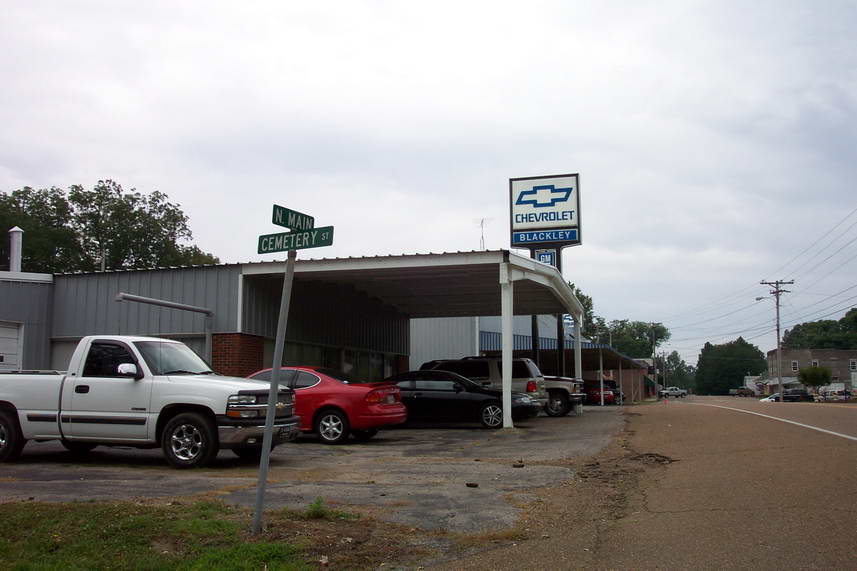
Hornbeak Lays Claim To The Oldest Chevrolet
Dealership In The State Of Tennessee
Blackley Chevrolet - Note Road Sign To Get To Cemetery
Recent news is that this dealership is now closed - 2012
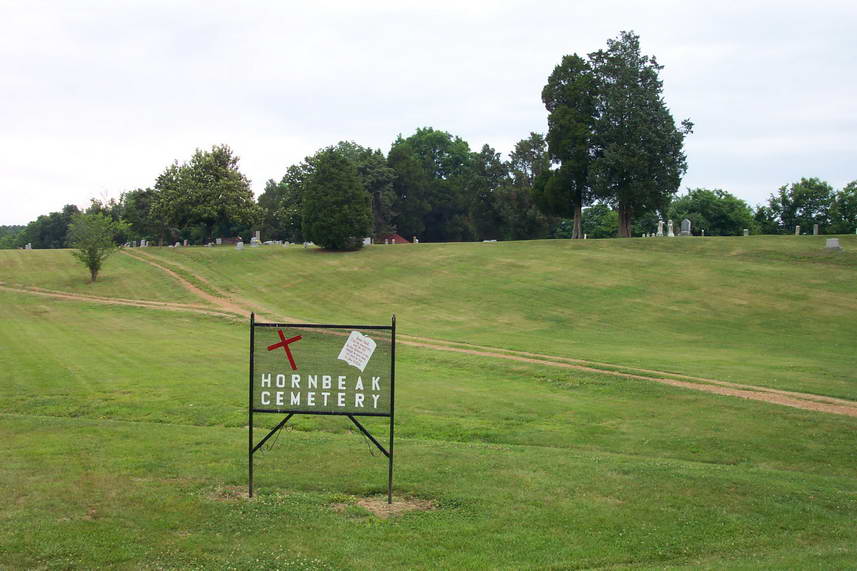
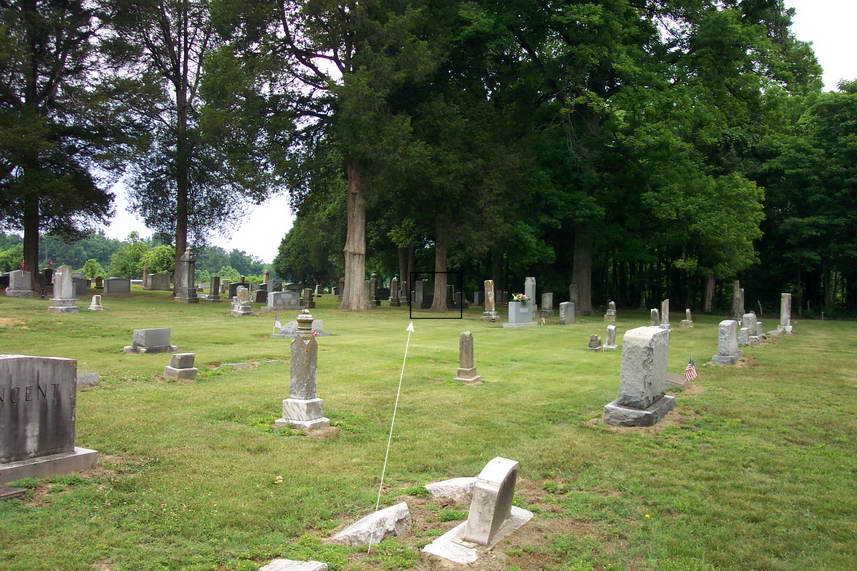
From Rear Of Cemetery
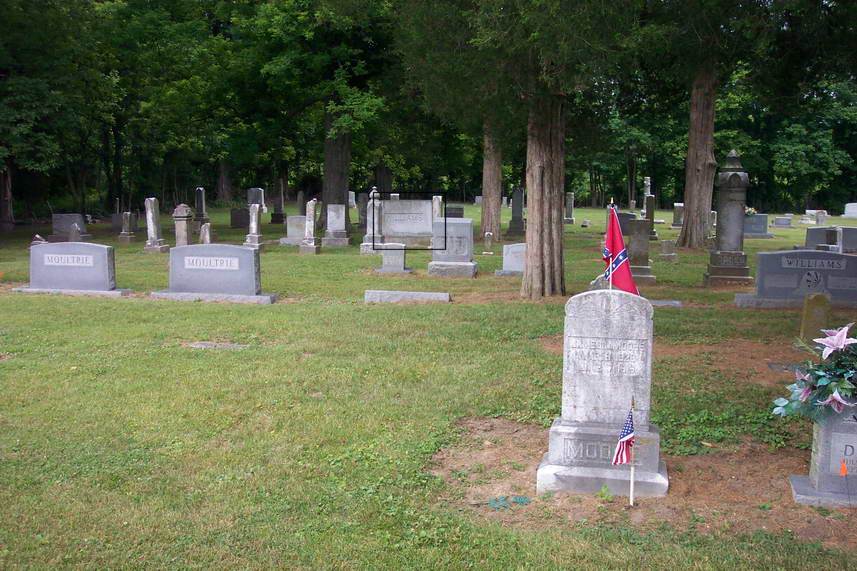
Looking Toward Rear Of Cemetery -
Williams Monument Outlined
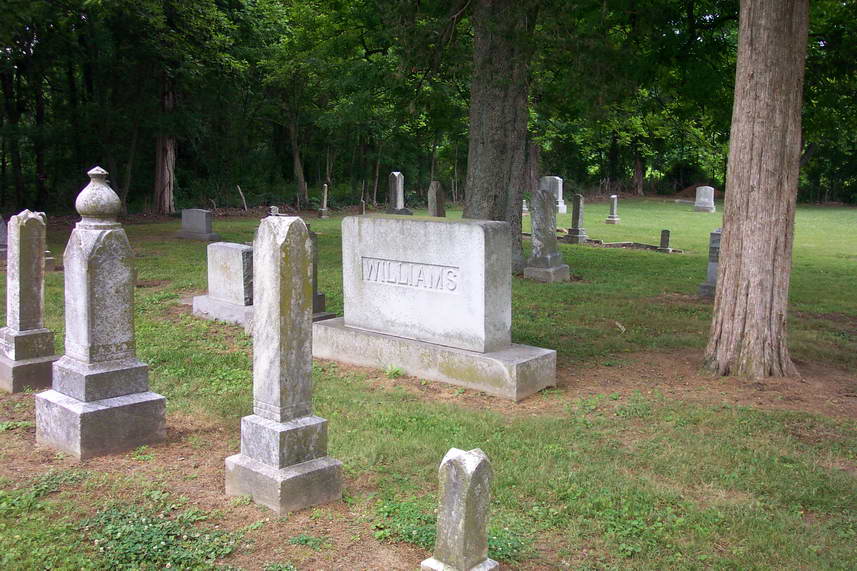
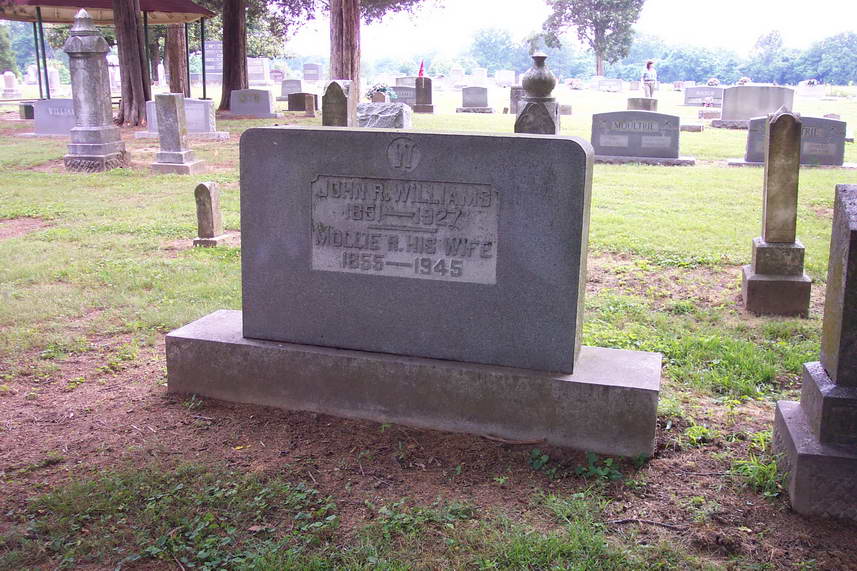
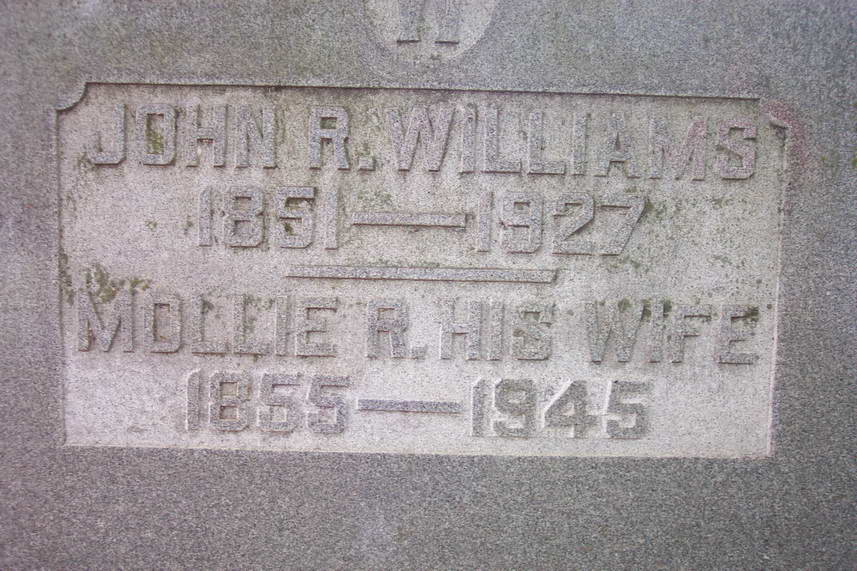
John R. Williams
1851-1927
Mollie R. Williams His Wife
1855-1945
![]()
Special Thanks to Tom L. Childers for providing the photo above of J.R. & Mollie Williams. He said he found it on Ancestry.com, where it was posted by a grandson, John Foster - August, 2012
I visited the grave of John R. Williams and took the other photos you see here in 2007.
![]()